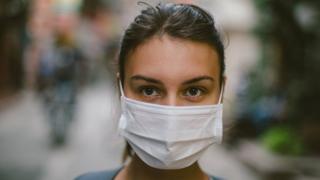
Translating…
 Portray copyright Getty Photos
Portray copyright Getty Photos Practical one of the critical abiding pictures of any virus outbreak is folks in surgical masks.
Utilizing them to prevent an infection is standard in quite loads of countries all the scheme thru the enviornment, most severely Chinaall over the new coronavirus outbreakthe place they are also dilapidated to offer protection to in opposition to excessive pollution ranges.
Virologists are sceptical about their effectiveness in opposition to airborne viruses.
Nonetheless there is some evidence to indicate the masks can help prevent hand-to-mouth transmissions.
Surgical masks had been first equipped into hospitals within the slack 18th Century nonetheless they didn’t make the transition into public utilize except the Spanish flu outbreak in 1919 that went on to assassinate over 50 million folks.
Dr David Carrington, of St George’s, College of London, told BBC News “routine surgical masks for the public usually are no longer an effective protection in opposition to viruses or bacteria carried within the air”, which used to be how “most viruses” had been transmitted, resulting from they had been too free, had no air filter and left the eyes uncovered.
Nonetheless they would per chance well per chance per chance help lower the possibility of contracting a scourge thru the “splash” from a sneeze or a cough and present some protection in opposition to hand-to-mouth transmissions.
A 2016 look fromOriginal South Walesurged folks touched their faces about 23 cases an hour.
Jonathan Ball, professor of molecular virology on the College of Nottingham, talked about: “In a singleproperly managed look in a clinical institution surroundings, the face hide used to be as proper at preventing influenza an infection as a cause-made respirator.”
Respirators, that are at possibility of characteristic a specialised air filter, are specifically designed to offer protection to in opposition to doubtlessly hazardous airborne particles.
“Nonetheless, if you plod to reports taking a agree with a study their effectiveness within the final population, the guidelines is much less compelling – or no longer it is rather a challenge to tackle a hide on for prolonged classes of time,” Prof Ball added.
Dr Connor Bamford, of the Wellcome-Wolfson Institute for Experimental Drugs, at Queen’s College Belfast, talked about “implementing easy hygiene measures” used to be vastly more supreme.
“Covering your mouth while sneezing, washing your palms, and no longer striking your palms to your mouth sooner than washing them, would possibly well per chance per chance help restrict the possibility of catching any respiratory virus,” he talked about.
The NHS saysessentially the most efficient scheme to stay faraway from catching viruses equivalent to fluis to:
- continually wash your palms with heat water and cleaning soap
- stay faraway from touching your eyes and nose wherever doable
- tackle a match and wholesome standard of living
Dr Jake Dunning, head of emerging infections and zoonoses at Public Effectively being England, talked about: “Even although there is a perception that the carrying of facemasks shall be critical, there is in actuality very shrimp evidence of new make the most of their utilize exterior of these scientific surroundings.”
He talked about masks needed to be dilapidated accurately, changed continuously and got rid of safely if they had been to work properly.
“Be taught also displays that compliance with these advised behaviours reduces over time when carrying facemasks for prolonged classes,” he added.
Folk would be better to focal point on proper personal and hand hygiene if they have an interest, Dr Dunning talked about.
